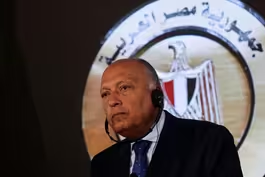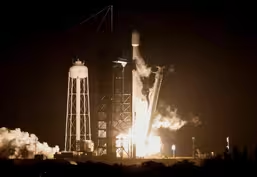
Why farmers around the world are protesting
Clip: 2/17/2024 | 5m 28sVideo has Closed Captions
‘We have reached the end of our rope.’ Why farmers around the world are protesting
From quiet fields to busy city streets, farmers around the world have launched protests in recent weeks, demanding relief from what they say is a crisis driven by climate change policies, red tape and crop prices. Ali Rogin reports.
Problems playing video? | Closed Captioning Feedback
Problems playing video? | Closed Captioning Feedback
Major corporate funding for the PBS News Hour is provided by BDO, BNSF, Consumer Cellular, American Cruise Lines, and Raymond James. Funding for the PBS NewsHour Weekend is provided by...

Why farmers around the world are protesting
Clip: 2/17/2024 | 5m 28sVideo has Closed Captions
From quiet fields to busy city streets, farmers around the world have launched protests in recent weeks, demanding relief from what they say is a crisis driven by climate change policies, red tape and crop prices. Ali Rogin reports.
Problems playing video? | Closed Captioning Feedback
How to Watch PBS News Hour
PBS News Hour is available to stream on pbs.org and the free PBS App, available on iPhone, Apple TV, Android TV, Android smartphones, Amazon Fire TV, Amazon Fire Tablet, Roku, Samsung Smart TV, and Vizio.
Providing Support for PBS.org
Learn Moreabout PBS online sponsorshipJOHN YANG: From quiet fields to busy city streets, farmers around the world have launched protests in recent weeks.
They're demanding relief from what they say is a crisis.
Ali Rogin reports on what's driving these protests and what it means for food supply and climate policies.
ALI ROGIN (voice-over): They come in convoys of tractors armed with the fruits, bread, even the livestock of their labor.
From Italy to India, farmers are taking to the streets, sometimes facing violence, sometimes causing it, protesting policies they say kill their livelihoods.
CRISTIAN BELLONI, Farmer, Italy (through translator): Agriculture has been on its knees for a long time, and we have reached the end of our rope.
ALI ROGIN (voice-over): In fact, farmers in dozens of countries on six continents have been staging protests since 2021.
This year, most protests have been in European countries and India.
The grievances vary by country, but there's one common message.
Farmers can no longer bear the burden of economic and climate policies.
DANIELLE RESNICK, International Food Policy Research Institute: There's a sense of a rupture in the social contract between farmers and their governments.
ALI ROGIN (voice-over): Danielle Resnick is a senior research fellow at the International Food Policy Research Institute.
DANIELLE RESNICK: In the EU it's a sense that farmers are being forced to unfairly bear the burden of a lot of the EU regulations to meet climate emission India, the sense that farmers are overburdened.
They're worried about various shocks, including climate shocks, and they want some type of social protection.
ALI ROGIN (voice-over): In Europe, those regulations include limits on pesticides and the amount of land they can harvest annually.
Farmers there also worry about competition from abroad and Ukraine, which has temporary tariff free access to EU markets.
MAN (through translator): Stop grain from Ukraine.
Stop the Grain Deal.
Stop deciding about our land.
ALI ROGIN (voice-over): In India, farmers want Prime Minister Narendra Modi to expand a long standing policy of setting minimum prices for certain crops.
In 2021 Modi tried but failed to scrap the policy following an earlier round of protests.
Farmers have been marching from the north, where the protests began, to the capital, but police and soldiers have blocked their way.
SARVAN SINGHH PANDHER, General Secretary Of Punjab Kisan Mazdoor Sangharsh Committee (through translator): It is not about whether we go to Delhi or not.
We have not come here to clash with our soldiers.
We just want our demands met for a law regarding the implementation of the minimum support price.
ALI ROGIN (voice-over): Experts say the protests are politically timed.
Both the Indian and European Parliament elections are set for this spring.
DANIELLE RESNICK: I think farmers unions are being politically savvy in some ways and trying to get their issues on the top of the political agenda.
Even though we think of them as kind of small scale farmers, they are pretty politically powerful.
ALI ROGIN (voice-over): And ahead of the votes, leaders seem to be listening to the farmers.
France scrapped a plan to end tax breaks for tractor diesel.
And the EU abandoned a plan to reduce pesticide use and postponed a deadline for farmers to leave some land fallow to improve biodiversity.
It also omitted farmers from a recommendation to reduce greenhouse gases by 90 percent by 2040.
URSULA VON DER LEYEN, European Commission President: Farmers need a worthwhile business case for nature enhancing measures.
Perhaps we have not made that case convincingly.
ALI ROGIN (voice-over): But many stakeholders, like some European moderates and environmentalists, believe politicians are caving to farmers to prevent them from deepening alliances with far right groups who've taken up their cause.
And they note that agriculture is a major driver of climate change, accounting for more than 10 percent of the EU's total greenhouse gases.
DANIELLE RESNICK: I think an attack of the Green agenda is seen as really an opportunity for right-wing parties to gain more seats in the parliament at the expense of green parties.
They see this as an opportunity to really mobilize on grievances to perhaps forward their own agenda around migration policies and other types of nativist policies that would resonate with some of EU farmers' concerns.
ALI ROGIN (voice-over): But some experts say leaders must find ways to make the transition less burdensome for farmers and the entire system they represent.
CHRIS HEGADORN, Sciences Po, Paris: Most of the world's food is produced by small farms, family farms.
And they're the ones who don't have the depth, the financial depth and the resources to really shoulder this burden in the way that they're being asked to.
They are being asked to adjust to environmental regulations in a fast period of time.
ALI ROGIN (voice-over): Chris Hegadorn is a professor of global food politics at Sciences Po in Paris.
CHRIS HEGADORN: This is where governments can step in and start spending money differently to address the cost, not only to these farmers, but the cost that we're seeing from environmental damage, climate change, temperature increases, violent weather increases.
ALI ROGIN (voice-over): After all, as the protesters sign say, without farmers, there is no food.
For PBS News Weekend, I'm Ali Rogin.
Egypt’s foreign minister on Israel-Hamas war’s repercussions
Video has Closed Captions
Clip: 2/17/2024 | 7m 25s | Israeli attack on Rafah would have ‘severe repercussions,’ Egypt’s foreign minister says (7m 25s)
How a new space race could be harming the Earth’s atmosphere
Video has Closed Captions
Clip: 2/17/2024 | 6m 12s | How a new space race could be harming the Earth’s atmosphere (6m 12s)
Providing Support for PBS.org
Learn Moreabout PBS online sponsorship
- News and Public Affairs

FRONTLINE is investigative journalism that questions, explains and changes our world.

- News and Public Affairs

Amanpour and Company features conversations with leaders and decision makers.












Support for PBS provided by:
Major corporate funding for the PBS News Hour is provided by BDO, BNSF, Consumer Cellular, American Cruise Lines, and Raymond James. Funding for the PBS NewsHour Weekend is provided by...


